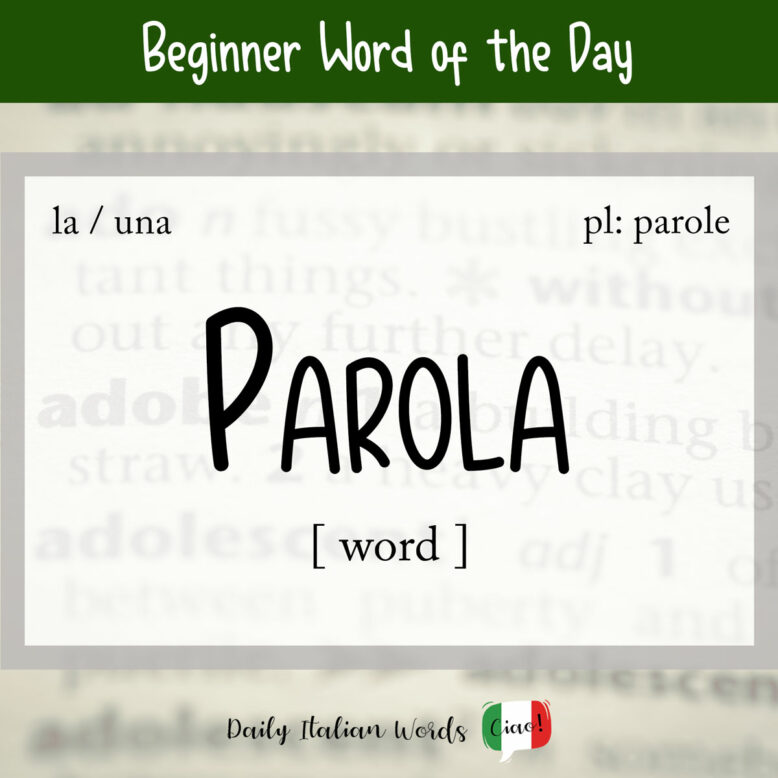Have you ever pondered the significant role that words play in our society? Words are not mere symbols; they hold immense power, shaping our thoughts, emotions, and interactions. Without words, we’d be stripped of the powerful means to express our thoughts, convey complex emotions, share knowledge, and communicate with others. (Not to mention that we’d have very little content for our Italian Word of the Day newsletter! 😉)
So, what is the word for word in Italian? It is parola, and if you thought it sounded similar to the English word parole, you’d be right: they originate from the same root.

Parola can be traced back to the Latin term parabŏla, which evolved into the Medieval Latin term *paraula in the first half of the 13th century.
It is a feminine noun, so it takes the following definite and indefinite articles:
- la parola = the word
- le parole = the words
- una parola = a word
- delle parole = (some) words
Oggi ho imparato una parola nuova.
Today I learned a new word.
Some common idiomatic phrases Italians use in everyday speech include parola per parola (word for word), in poche parole / in parole povere (in short, long story short), and in una parola (to sum up).

As in English, parola (and especially the plural parole) can also be translated as word/words with the meaning of remarks, speech or idle chatter depending on the context. For example:
- Rimanere senza parole = To be speechless (lit. to remain without words)
- Queste sono solo parole = This is just idle chatter
- Avere l’ultima parola = To have the last word (i.e. the last remark)
- Avere la parola pronta = To have a ready answer
When someone intentionally uses an excessive number of words in order to be vague or evasive, it can be described as employing giri di parole in Italian, which literally translates to “rounds of words.”
Basta con questi giri di parole, vieni al dunque!
Enough beating around the bush, get to the point!
It can also denote speech in general, as in the human capacity to talk, when used with the article la (the).
La parola è una delle cose più importanti che possiede l’essere umano.
Speech is one of the most important things that human beings possess.
By extension, it can also mean way with words or gift of gab. (Avere il dono della parola = to have a way with words / the gift of gab)

Much like the English term word, the Italian parola can also mean promise, assurance, recommendation, or one’s account of the truth. Take into consideration the following idiomatic expressions:
- Hai la mia parola! = You have my word!
- Mantenere la parola = To keep one’s word
- Essere di parola = To be as good as one’s word
- Credere sulla parola = To take someone at their word
- Mancare di parola = To break one’s word
- Una persona di parola = A person of his word
- Metterci una buona parola = To put in a good word
It is from this definition that the connection to the English term parole becomes evident, as it refers to the release of a prisoner based on the promise of good behaviour.
Parola d’ordine (lit. word of order) is a synonym for secret word, code word, and password. However, when referring to computers and technology, Italians use the English term password instead. Parola chiave, on the other hand, means keyword.
Yet another alternative definition is message or teaching, particularly from a higher being (e.g. la parola di Dio = the word of God).

Parola can refer to someone’s right to speak, as can be seen in the expression dare / lasciare / prendere la parola (to give someone / hand over / take the floor).
Finally, the pejorative version parolaccia is the translation for a swear word.
Smettila di dire tutte queste parolacce!
Stop saying all those swear words!
Wrapping up the article, here is a selection of practical expressions featuring the word parola that you can incorporate into your daily conversations with Italian friends. Enjoy!
È una parola!
Literal translation: It’s a word!
English meaning: Easier said than done! / It’s not a small matter!
Ti prendo in parola.
Literal translation: I take you at your word.
English meaning: I’ll take your word for it.
Basta la parola!
Literal translation: The word is enough!
English meaning: Just say the word!
Togliere la parola (le parole) di bocca
Literal translation: To take the words out of someone’s mouth
English meaning: To take the words out of someone’s mouth
Mettere parole in bocca a qualcuno
Literal translation: To put words in someone’s mouth
English meaning: To put words in someone’s mouth
Heather Broster is a graduate with honours in linguistics from the University of Western Ontario. She is an aspiring polyglot, proficient in English and Italian, as well as Japanese, Welsh, and French to varying degrees of fluency. Originally from Toronto, Heather has resided in various countries, notably Italy for a period of six years. Her primary focus lies in the fields of language acquisition, education, and bilingual instruction.


